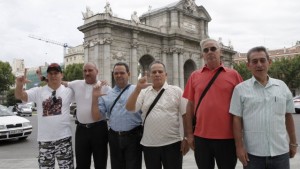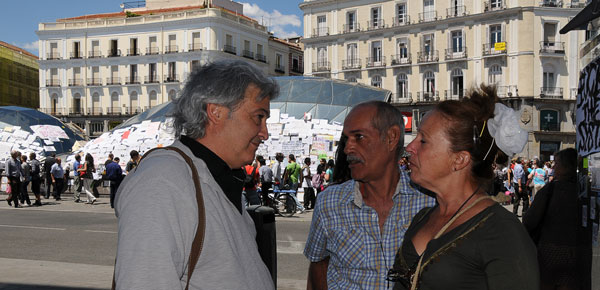HAVANA, APRIL 12, 2012 – “My name is Barbara Dueñas. I’m one of the relatives of the former Cuban political prisoners who arrived in Spain in August 2010. I’m the ex-wife of Marcelo Cano, from the “Group of 75” [imprisoned in 2003]. I live in Tarragona and I’m alone with my daughter. Since February 19, I haven’t received any assistance and I don’t know what to do.”
Barbara’s letter appeared in en Periodistas en Español, where she says: “There hasn’t been one day that I haven’t cried since I came to this country. I feel like a helpless prey. I’m sick, both me and my daughter. Now, Social Services want to take my daughter away from me for not being able to maintain her.”
Almost at the same time, we learned of the suicide in Palmas de Gran Canarias [Canary Islands] of Albert Santiago Du Bouchet, who was a dissident Cuban journalist and a former political prisoner exiled in Spain since he was released in Cuba last year.
The crash could be seen coming. A year ago, walking around Madrid, I met some of those who had been released. They asked me to do a report revealing the appalling living conditions which they were suffering under the government of the Spanish Socialist Workers Party (PSOE).
Months later, another colleague published an article about a group of dissidents who camped outside of Spain’s Ministry of Foreign Affairs to protest the government-run shelter that had kicked them out, accusing them of rowdiness.
In the Plaza Sol, the then recently released dissident Orlando Fundora explained that they had conflicts with the PSOE because “our ally is the [conservative] People’s Party (Partido Popular or PP).” That’s why I was so surprised that the now PP government of Mariano Rajoy would cut off their financial assistance.
They didn’t expect such a position from a right-wing government and now they are truly angry. “I didn’t leave one dictatorship to get mixed up with another one,” said dissident Randol Roca who arrived in Spain a year ago.
He told a reporter, “I want freedom,” though actually he wasn’t protesting any restrictions on their ability to speak, assemble or associate. Rather, he was upset over a cut in aid of $117 (US) that they each received at the beginning of every season to buy new clothes.
According to EFE, the socialist government had created an 18-month transitional assistance plan to support the released Cubans, giving each family 700 euros a month for rent and providing each household member with 180 euros, for a total allocation that reached a considerable sum.
Authorities explain that the period of assistance simply ran out, though Roca suspects they’re stealing his check. “My Lord, where’s the money for political refugees in Spain?” he asked, but then he responded by saying, “It’s being diverted somewhere.”
“We left Cuba with nothing, and on the plane that brought us to Spain they promised us a place to live and work,” said Roca, but he claims that now nearly all of the released prisoners and their families — around 700 people — are unemployed.
Some of them left for the US, but things there aren’t much better. A recent report done in Miami showed the mother of Orlando Zapata (who died on a hunger strike) mopping floors to survive.
In addition, Washington is reluctant to grant visas to the released prisoners and their families. So far these have only been obtained by the “Group of 75.” The rest were denied political refugee status because they live in Spain, where no one is persecuting them.
For the US, political asylum doesn’t even fit the case of the dissident Carlos Martinez, who is awaiting trial in a Malaga jail cell as the result of a street brawl. Previously, he had spent 10 years in prison in Cuba, explained his wife Marcia.
She is a woman who seems desperate. She says she cries every day and is starting to suffer a nervous condition. No wonder, her government assistance has been cut, she’s unemployed, lives in a house where “there are mice and cockroaches,” and her husband is back behind bars.
Marcia is demanding a visa for the US, where she thinks that things would go better for her. However if Washington doesn’t yield, she’ll ask for authorization from Havana to return to live on the island, “We, the family members, should be able to return to Cuba.”
Ricardo Gonzalez, another dissident in exile in Spain, summed it all up saying that the frustration of those who were released is due to the gap between the expectations they had when leaving Cuba and the reality they found once they arrived in Spain.
“I dreamed I would be here, from when I was in a crowded prison. I dreamed I would see myself in a more flattering condition,” wrote the Spanish writer Calderon de la Barca, who concluded by recalling, “Every life is a dream, and dreams, are dreams.”
Sources: CartasDesdeCuba/FernandoRavsberg/RaquelPerez/InternetPhoto/The Cuban History
After the Dreamed Paradise/ TheCubanHistory.com/ Arnoldo Varona, Editor
Trás el Paraiso Soñado
By Fernando Ravsberg 
Encuentro en el centro de Madrid con los disidentes excarcelados de Cuba, año 2011. (Foto: Raquel Pérez)
HABANA, 12 de Abril 2012 -“Me llamo Bárbara Dueñas, soy uno de los familiares de los expresos políticos cubanos llegados a España en agosto del 2010, exesposa de Marcelo Cano, del grupo de los 75, resido en Tarragona y estoy sola con mi hija. Desde el 19 de febrero no recibo ayuda y no sé qué hacer”.
La carta de Bárbara apareció en Periodistas en Español y en ella nos cuenta que “no hay un día que no llore desde que llegué a este país, me siento presa y desamparada, estoy enferma yo y mi hija. Ahora los servicios sociales me quieren quitar a mi hija por no poderla mantener”.
Casi al mismo tiempo nos enterábamos de que en Palmas de Gran Canarias se había suicidado Albert Santiago Du Bouchet, un periodista disidente cubano, exprisionero político, exiliado en España desde que fuera liberado el pasado año.
El choque se veía venir, hace un año, paseando por Madrid me encontré con algunos de los excarcelados y me pidieron que hiciera un reportaje denunciando las pésimas condiciones de vida a las que los sometía el gobierno del PSOE.
Meses después otro colega publicó un artículo sobre un grupo de disidentes que acamparon frente al Ministerio de Relaciones Exteriores de España para protestar contra el Centro de Acogida que los expulsó, acusándolos de formar broncas.
En la plaza Sol, el disidente Orlando Fundora -recién liberado- me explicó que tenían conflictos con el PSOE porque “nuestro aliado es el Partido Popular”. Por eso me sorprendió tanto que el gobierno de Mariano Rajoy les suprimiera las ayudas económicas.
No esperaban semejante actitud de un gobierno de derechas y están verdaderamente enojados, “no salí de una dictadura para meterme en otra”, aclara a una agencia de prensa internacional el disidente Randol Roca, quien llegó a España hace un año.
Le dice a la periodista “quiero libertad” aunque en realidad no protesta porque le niegan su posibilidad de expresarse, reunirse o asociarse sino por una ayuda de US$117 que recibían al inicio de cada temporada para comprar ropa.
Según un cable de EFE, el gobierno socialista creó un plan de asistencia de 18 meses para apoyar a los excarcelados cubanos con unos 700 euros mensuales para el alquiler por familia y 180 euros más por cada uno de sus miembros, alcanzando una suma millonaria.
Las autoridades dicen que se acabó el periodo de asistencia pero Roca sospecha que se están robando su cheque. “¿Señor mío, dónde está el dinero destinado a los refugiados políticos en España?”, pregunta y el mismo se responde que “se está yendo por otro lado”.
“Partimos de Cuba con lo puesto, y en el avión que nos trajo a España nos prometieron casa y trabajo”, dice Roca y asegura que casi todos los expresos y sus familiares -unas 700 personas- están desempleados en la Madre Patria.
Algunos de ellos se marcharon a EE.UU. pero por allá las cosas no están mucho mejor, un reciente reportaje hecho en Miami muestra a la madre de Orlando Zapata -muerto en una huelga de hambre- limpiando pisos para sobrevivir.
Además Washington es reacio a otorgar visas a los excarcelados y sus familiares, hasta ahora solo lo han conseguido los del Grupo de los 75. Al resto se les niega el estatus de perseguido político porque viven en España y allí nadie los persigue.
Para EE.UU., el asilo político ni siquiera cuadra en el caso del disidente Carlos Martínez quien espera en una prisión de Málaga el resultado de un juicio por una riña callejera. En Cuba había pasado 10 años en prisión, según explicó su esposa Marcia.
La mujer parece desesperada. Dice que llora cada día y que enfermó de los nervios. No es para menos, le cortan las ayudas estatales, está desempleada, vive en una casa donde “hay ratones y cucarachas” y su esposo vuelve a estar tras las rejas.
Marcia reclama una visa de EE.UU., donde cree que las cosas le irán mejor pero, si Washington no cede, entonces exige la autorización de La Habana para volver a residir en la isla, “nosotros, los familiares, deberíamos poder regresar a Cuba”.
Ricardo González, otro disidente exiliado en España, resume que la frustración de los excarcelados se debe al abismo existente entre las expectativas que tenían al salir de Cuba y la realidad que encontraron al llegar a la Madre Patria.
“Yo sueño que estoy aquí, destas prisiones cargado, y soñé que en otro estado más lisonjero me vi”, escribió el español Calderón de la Barca y al final concluyó recordando “que toda la vida es sueño y los sueños, sueños son”.
Sources: CartasDesdeCuba/FernandoRavsberg/RaquelPerez/InternetPhoto/The Cuban History
After the Dreamed Paradise/ TheCubanHistory.com/ Arnoldo Varona, Editor






